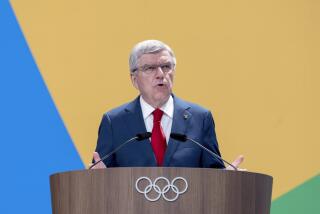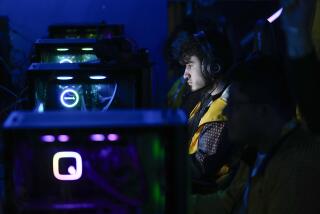Baltic Nations Might Have ’92 Olympic Teams : IOC: Samaranch says that the process would be easy because Estonia, Latvia and Lithuania are former members.
- Share via
TOKYO — International Olympic Committee President Juan Antonio Samaranch said Wednesday that the apparent disintegration of the Soviet Union could have an almost immediate impact on international sports, speculating that the three Baltic republics--Estonia, Latvia and Lithuania--will participate as independent nations in the 1992 Summer Olympics at Barcelona, Spain.
“I think we are seeing the red flag for the last time,” he said, referring to the Soviet hammer and sickle that was raised over the National Stadium four times for gold medalists during the first four days of track and field’s World Championships.
Samaranch said he expects the issue to be raised at an IOC executive board meeting Sept. 16-17 in Berlin.
“We will not take any kind of decision until there is a political decision by the main states in the world,” said Samaranch, Spain’s ambassador to the Soviet Union before becoming IOC president in 1980. “By that, I mean the United States, Europe and Japan.
“But if the Baltic countries are recognized as full independent states . . . the IOC would react very quickly, maybe at the board meeting next month, to give them provisional recognition.”
He said such recognition would allow them to send “some dozens” of competitors to Barcelona, although he added it might be impossible for the republics to enter a full complement of athletes in all sports because of space shortages in the athletes’ village. He also said it is too late for them to enter team sports because the qualification process has already begun in most or already been completed.
As for the 1992 Winter Games in Albertville, France, he said: “I think it is too soon (for them to compete), but it’s possible.”
Asked whether it would be possible for athletes from the Baltics to continue competing for the Soviet Union in Albertville, or in team sports at Barcelona, even if their republics are granted IOC membership as independent nations, he said: “We are very flexible. We do not want to put obstacles in front of people. If they agree among themselves, why not? But that’s a very complicated situation not only for the IOC, but for the world.”
Samaranch said sports officials from Estonia, Latvia and Lithuania have twice visited IOC headquarters at Lausanne, Switzerland, to seek his advice on the formation of independent Olympic committees and that he recently received a delegation from the Soviet republic of Moldavia to discuss the same issue. But he said the Baltic republics would have an easier path to IOC recognition because they formerly were members.
“The Baltic countries would not be an admission,” he said. “It would be a re-admission.”
Between the world wars, all three competed in the Olympics as independent nations. Between 1920 and 1936, Estonia competed in the Summer Olympics five times and the Winter Olympics twice. Latvia competed in four Summer Olympics between 1924 and 1936. Lithuania competed in the Summer Olympics of 1924 and 1928.
Today, several of the Soviet Union’s best athletes in basketball, bobsledding and yachting are natives of the Baltics.
Samaranch said Estonia, Latvia and Lithuania are not recognized as independent by any international sports federations, but he said he believes the federations would follow the IOC’s lead.
More to Read
Go beyond the scoreboard
Get the latest on L.A.'s teams in the daily Sports Report newsletter.
You may occasionally receive promotional content from the Los Angeles Times.






